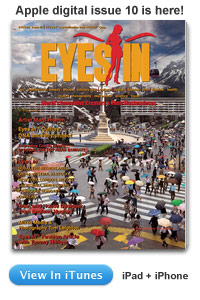English Translation of The Time of Women
| Feb 4 2012 | (01:08:08 - EDT)
Glagoslav Publications presents the English translation of Elena Chizhova's book “The Time of Women”, which weaves together the personal and historical struggles of mothers, daughters, grandmothers, and women who become sisters through circumstance, in “a secret culture of resistance and remembrance.
The Russian Booker Prize winning novel “The Time of Women” tells the story of three old women raising a small mute girl, Suzanna, in a communal apartment in the Soviet Union of the 1960s. Memories of hardship in first cataclysmic half of the century, as well as the loss of their own children, have receded in the background of everyday worries – such as how to preserve flour from one season to the next, or how to afford a wool suit for the 7-year-old girl.
Here the author gives priority of voice to the grandmothers who, having lost their families in the World War II siege of Leningrad, quietly tell their stories to the future writer during confidential conversations at home. Chizhova uses these scraps of stories to form the base of her narrative, voicing the terrible facts of the siege in contrast to official versions from Soviet books.
Antonina, a factory worker and single mother, gets a room in a communal apartment that she and her little girl share with three elderly women. All have lost their families and become “grannies” to little Suzanna. She responds to their stories about the Revolution, the early days of the Soviet Union, and the blockade and starvation of World War II by drawing beautiful pictures, but she remains mute. If the authorities find out she will be taken from her home and sent to an institution.
When Antonina falls desperately ill, the grannies are faced with the reality of losing the little girl they love – unless a stepfather can be found before it is too late. And in this “time of women”, what they need is just a bit of kindness and cooperation from a man.
The novel features a variety of characters representing a collage of Soviet society, which only seems to be equal and to treat all its citizens alike: the former aristocracy, the intelligentsia, villagers secretly mocking communist ideals while hoping only for God's help, low-level party officials, trade union members ardently loyal to the Soviet Union, factory workers just starting to believe in the benefits of Soviet society and hoping that one day it will actually be possible to have a washing machine at home.
The female characters of the book combine all that is left from the past and inspired by their present: rural beliefs, religious views, the remnants of aristocracy, the myths of Soviet reality and ideology. All these elements intricately combined in the minds of these not-quite-yet-Soviet individuals and define the practice of their everyday lives. For them, tragedy is not a single event, loss has become ordinary, and stories about it just happen to come up in everyday conversation. Because such is the reality of their lives.
Chizhova’s book is not completely autobiographical – the writer has reproduced what may be called family historical heritage: “In some sense, I write about my childhood. I did not attend a kindergarten; my mother and grandmother always talked about the siege as they experienced it, and how my grandfather and grandmother died. This was the background of my childhood, and I can’t say it shocked me. I felt that it was the norm”.
The emotional tension of the book with its complicated narrative structure, transferring the speaking voice from one character to another, has aroused the interest of theater directors: it has been successfully realized as a play by the famous Moscow Sovremennik Theater ("The Contemporary").
About the Author
Born in Leningrad in 1957, Elena Chizhova worked as an economist, teacher, and entrepreneur until a rescue from a burning cruise ship in 1996 inspired a change in her life focus. She became a writer, and has gone on to be nominated for and to win several prestigious literary awards, including the Shortlist Russian Booker Prize in 2003 and 2005, and the Russian Booker prize for Time of Women in 2009.
About Glagoslav Publications
Glagoslav Publications is an English-Dutch publishing company specializing in contemporary fiction and non-fiction by Russian, Ukrainian and Belorussian authors, as well as significant works from the past that, despite their enduring relevance, are currently unavailable in English and Dutch.
- (44) photography
- (38) Berlinale
- (35) Berlin International Film Festival
- (30) Cannes film festival
- (28) Sundance Film Festival
- (27) Festival de Cannes
- (26) London Fashion Week
- (21) Cannes Film Festival 2012
- (18) Mercedes-Benz Fashion Week
- (15) art exhibition












Reactions